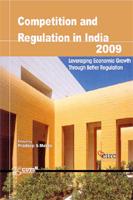GENERAL QUESTIONNAIRE-ICRR09
Biennial review of Competition & Regulations Scenario in India to promote effective markets
ICRR-II Cycle(2009)
Publications
Report
- Competition and Regulation in India, 2009 – A Curtain Raiser
- Competition and Regulation in the Indian Port Sector
- Leveraging Economic Growth Through Better Regulation
- Roundtable on “The Political Economy of Regulation in India-What do we need to do?” and Release of the Report “Competition and Regulation in India 2009”
Monograph
Briefing Paper
Policy Brief
Event
March 28, 2009, New Delhi

